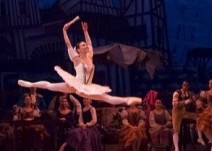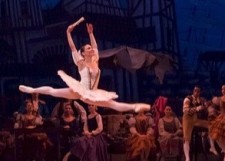 Actor Lord Laurence Olivier aimed at perfect performances, as did Peter O’Toole, Olivier’s successor as the world’s greatest actor–the perfect performances in the perfect tragedies as the perfect characters–as Hamlet, King Lear, Othello, or Iago. One night Olivier felt that he had achieved perfection in a performance. Others in the cast also told him he had. He said, “What I’m thinking is I’ve done it, but will I be able to do it again?” Perfection is difficult and rare. It is hard to repeat. It is a concept that grows in importance to artists as their skills and accomplishments ascend to high levels.
Actor Lord Laurence Olivier aimed at perfect performances, as did Peter O’Toole, Olivier’s successor as the world’s greatest actor–the perfect performances in the perfect tragedies as the perfect characters–as Hamlet, King Lear, Othello, or Iago. One night Olivier felt that he had achieved perfection in a performance. Others in the cast also told him he had. He said, “What I’m thinking is I’ve done it, but will I be able to do it again?” Perfection is difficult and rare. It is hard to repeat. It is a concept that grows in importance to artists as their skills and accomplishments ascend to high levels.
In her essay “Dancers and the Dance” Susan Sontag states that dance differs from the other performing arts. The standards which dancers measure their performance against is not that of the highest excellence as it Is with actors, singers, and musicians. Sontag believes that the dancer’s standard is perfection. She says, “Every serious dancer is driven by notions of perfection–perfect expression, perfect technique.”
Sontag says that dance demands more of the dancer than any other art or any sport demands. She writes, “While the daily life of every dancer is a full-time struggle against fatigue, strain, natural physical limitations and those due to injuries (Which are inevitable) dance itself is an enactment of an energy which must seem, in all respects, untrammeled, effortless, at every moment fully mastered.” When performing, dancers must hide their pain behind a performing smile. Injuries must be hidden. The dancer’s performance smile is “a categorical denial of what he or she is actually experiencing.” Behind the grace of the dancers is much discomfort and pain they endure while training themselves for such performances and while performing.
 It is true that serious dancers currently and throughout history have aimed at perfection, but other artists–usually the best in the art, those that are aware that they have a significant talent–also aim for perfection in their work, I believe. Those who do aim for perfection in their novels, musical composition, and paintings and other art works let it be known through their obsessions with their work that they are extremely serious about their art, and are willing to face its challenges with drive and commitment.
It is true that serious dancers currently and throughout history have aimed at perfection, but other artists–usually the best in the art, those that are aware that they have a significant talent–also aim for perfection in their work, I believe. Those who do aim for perfection in their novels, musical composition, and paintings and other art works let it be known through their obsessions with their work that they are extremely serious about their art, and are willing to face its challenges with drive and commitment.
The urge for perfection begins, I think, with a niggling, Then the artists become increasingly aware after a number of works have been produced and (usually but not always) thousands of hours have been put in, that perfection is within their reach and not merely a remote fantasy–that THEY–Faulkner, Picasso, Stravinsky, Cassatt, Proust, Cezanne, and Virginia Woolf–have what it takes.
To be an artist seeking perfection you have to possess art-relevant traits that will equip you for a creative life. If your ambition is perfection, and you are not self-critical and self-demanding, you will have problems. The artist aiming to produce perfect works has to be self-critical, always looking for faults in the works and in themselves that will have to be corrected. When Sontag had praised a dancer for a superb performance she heard “a disconsolate litany of mistakes that were made–a beat missed, a foot not pointed in the right way.” Sontag adds: “In no other art can one find a comparable gap between what the world thinks of a star and what the star thinks about himself or herself, between the adulation that pours in from the outside and the relentless dissatisfaction that goads one from within….Part of being a dancer is this cruelly self-punishing objectivity about one’s shortcomings, as viewed from the perspective of an ideal observer, one more exacting than any real spectator could ever be.”
Intense concentration is necessary too if you hope to produce a perfect artistic performance; this is true of every art. All you need do is look at the intensity of the eyes of an artist painting, or a writer at the keyboard to realize that. Everything in the artist’s mind that is not needed for the artistic performance is ignored, and only what the performance requires is brought into attention. Anyone who produces great works that are the result of the mind in action such as archers, mathematicians, and artists of unrivaled talent like dancer Mikhail Baryshnikov project a state of extreme (yet also relaxed) focus. Sontag says that state is not just something that is necessary for a great performance, but, “It is the performance, the very center of it.”
 When they are watching the performance of a play what the audience hopes to see more than anything else is a virtuoso performance they will not be able to forget however long they live and how many plays they see. The virtuoso performance is the single most exciting and popular feature not only of drama but of any art, and the most thrilling feature of a virtuoso performance is not the possibility that the artist may fail. Rather, it is the spectacle of succeeding in an extraordinary way–a performance that is perfect because it has no errors. All the time I am listening to music as I do all day long or reading a narrative I think is great such as James Joyce’s short story “Araby,” and Frank Sinatra’s rendition of “In the Wee Small Hours of the Morning” I am thinking, “Keep it up James and Frank. Don’t fail. Continue being great until the story or the song is finished and perfect from the beginning to the end”
When they are watching the performance of a play what the audience hopes to see more than anything else is a virtuoso performance they will not be able to forget however long they live and how many plays they see. The virtuoso performance is the single most exciting and popular feature not only of drama but of any art, and the most thrilling feature of a virtuoso performance is not the possibility that the artist may fail. Rather, it is the spectacle of succeeding in an extraordinary way–a performance that is perfect because it has no errors. All the time I am listening to music as I do all day long or reading a narrative I think is great such as James Joyce’s short story “Araby,” and Frank Sinatra’s rendition of “In the Wee Small Hours of the Morning” I am thinking, “Keep it up James and Frank. Don’t fail. Continue being great until the story or the song is finished and perfect from the beginning to the end”
Playwright Eugene O’Neill, America’s greatest and most innovative dramatist, was awarded the Nobel Prize in Literature in 1936. Long Day’s Journey into Night was his masterpiece. One of his experiments was revealing the characters’ interior monologue. Another was making the speech of poor, uneducated characters a part of the drama. Another Nobel Prize winner–Saul Bellow–who said that writing was more important than his wife and children–aimed to write perfectly. A third Nobel Prize winner–Ernest Hemingway–made no secret that his aim was to produce perfect works and be the greatest writer in the world. Many critics believe he accomplished that goal. Writer Joan Didion thought his every sentence was written with such craftsmanship that it was perfect. Many critics, teachers, and writers consider the short stories and plays of Anton Chekhov, the founding father of modern theatre, and the leading prose writer of his era, perfect. It is hard to tell what a Chekhov story or play “means” because he does not judge or clarify meanings; meanings are left to the reader or audience.
Perfection in the arts is always attributable to the personality of the artists that filters through their talent. The artist aiming to produce perfect works must keep the audience clearly in mind. Critic Gilbert Murray said that writers who have the powers of revelation are the ones who have experienced–seen or felt–more than the average run of intelligent beings. Behind every work, whether poor or great, are the tastes and the disposition of the person who created it, as well as a sensitivity to the audience. In the theatre the actor’s aim is through the performance to jolt the members of the audience–to please in a powerful way, to be accepted as though a friend, to lodge securely and permanently in their memory, displacing less important things.
 The days and nights of everyday living of the artist seeking perfection must be filled to the brim with their art. More than likely, the artist has grown up with it, seen it mature, and watched it take over a good part of his or her being. Short story master Raymond Carver reflecting on his career put it this way: “conversation was fine, camaraderie was fine, making love was fine, raising a family was okay, but interfered with writing.”
The days and nights of everyday living of the artist seeking perfection must be filled to the brim with their art. More than likely, the artist has grown up with it, seen it mature, and watched it take over a good part of his or her being. Short story master Raymond Carver reflecting on his career put it this way: “conversation was fine, camaraderie was fine, making love was fine, raising a family was okay, but interfered with writing.”
© 2019 David J. Rogers
For my interview from the international teleconference with Ben Dean about Fighting to Win, click the following link:
Order Fighting to Win: Samurai Techniques for Your Work and Life eBook by David J. Rogers
or
Order Waging Business Warfare: Lessons From the Military Masters in Achieving Competitive Superiority
or












































